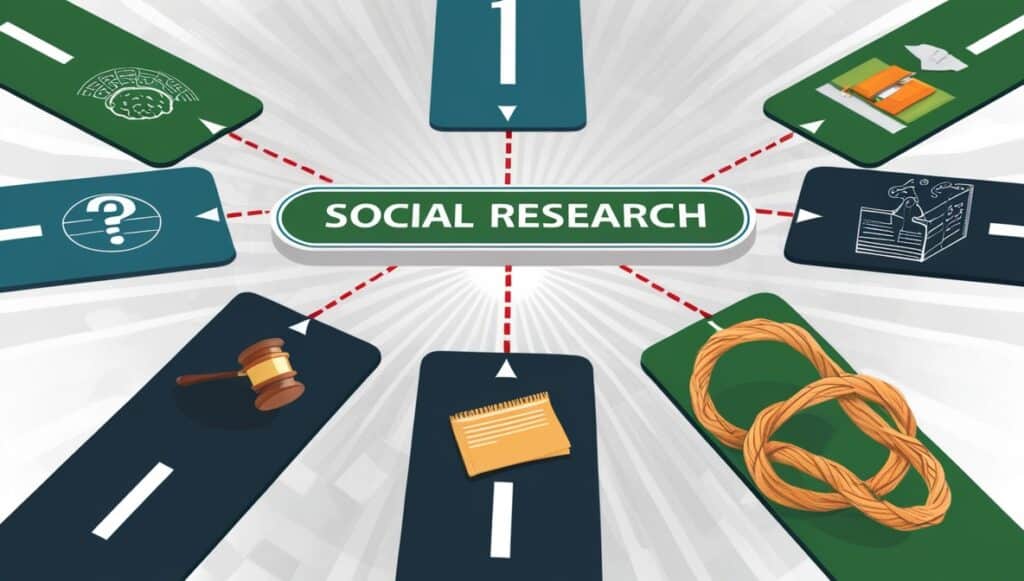Alternatives to Social Research
Prior to looking into the common errors, let us establish a clear understanding of the concept of “alternatives to social research.” These strategies are primarily related to gaining knowledge about the social environment that deviates from the rigorous and systematic methodology of social science research.
They frequently depend on own experience, intuition, or knowledge obtained from others. Social science research uses systematic and empirical methodologies to examine human behavior and cultures. Nevertheless, when individuals or organizations avoid these approaches, they frequently become at risk of several cognitive biases and mistakes in reasoning that refer to alternatives to social research.
Common Alternatives in Research
Many prevalent substitutes for rigorous social science research are presented below that might result in misunderstandings and inaccurate conclusions. These common alternatives to social research are as under;
Personal Experience
This approach is based on own life experiences and innate impulses to comprehend the universe. The concept is grounded on the notion that individual observations and intuition yield precise information. Nevertheless, individual biases and a narrow perspective might restrict its effectiveness.
Knowledge from Mass Media
This approach is one of the alternatives to social research that entails gathering information mostly from news outlets, television broadcasts, and online sources. Although the information is readily available, it may lack depth, be influenced by personal opinions, or be exaggerated for dramatic effect. It frequently lacks depth and fails to capture the complete complexity of matters.

Authorities and Experts
This strategy is also one of the alternatives to social research involves, without question, accepting the statements of individuals in positions of authority or those who possess expertise. Put simply, it refers to unquestioningly accepting information from someone who is seen as competent or authoritative. Although experts might offer significant insights, unquestioningly relying on them can be deceptive. It is important to thoroughly assess their assertions and take into account alternate viewpoints.
Ideology and Values
Another alternatives to social research is the approach that involves establishing views based on individual or collective values and ideas rather than objective facts. Although values have significance, they can potentially cover up judgment and hinder objective examination. In order to achieve precise comprehensions, it is crucial to consider data and a variety of perspectives.
Common Errors in Research
Overgeneralization
An example of a common error is overgeneralization, which occurs when individuals make sweeping generalizations based on a narrow range of data. This phenomenon, known as overgeneralization arises when an individual extrapolate the behavior of a few individuals within a certain group to the whole group.
These findings frequently result in stereotypes and unjustified assumptions, distorting the variety and complexity that constitutes human behavior. The risk resides in the extensive utilization of these restricted observations, leading to biased views that fail to adequately represent the genuine nature of social dynamics.
Selective Observation
Another common cognitive error is selective observation. In this scenario, individuals concentrate only on facts that align with their preconceived notions while disregarding evidence that contradicts them. For instance, an individual may selectively observe actions that validate their preconceived notions about a certain group while disregarding behaviors that contradict those notions.

This biased observation perpetuates preexisting prejudices, hindering impartial evaluation and distorting the impression of reality. By selectively admitting information that aligns with their own beliefs, individuals restrict their comprehension and lose the chance to acquire a more comprehensive and impartial viewpoint.
Premature Closure
It refers to the tendency to embrace a conclusion without thoroughly scrutinizing all the data or considering alternative possibilities. This tendency frequently results in simplified interpretations of social occurrences as individuals prematurely choose explanations without thoroughly examining all possible components.
The outcome is constrained critical thinking and impeded exploration of more precise or complex explanations. Prematurely reaching conclusions might lead to the oversight of crucial complexities and nuances, which are essential for gaining an extensive understanding of the issue.
Halo Effect
The halo effect is a prevalent cognitive bias in which an individual’s perception of a person, group, or object in one context significantly impacts their judgments and evaluations in another context. An example of this would be the tendency to make inaccurate judgments in recruiting or leadership assessments based on the assumption that someone’s popularity or attractiveness automatically correlates to competence and trustworthiness in other areas.
This cognitive bias, known as the halo effect, happens when a good or negative quality dominates and influences the perception of other traits, resulting in an unwarranted generalization of that impression to other areas.
False Consensus
The false consensus effect defines an ability to exaggerate the extent of agreement others possess with one’s own beliefs, attitudes, and actions. This cognitive error can lead to misinterpretations in social interactions since individuals frequently overestimate the extent to which their opinions are commonly held.
This can result in polarization and conflict when divergent viewpoints are not recognized, as individuals presume agreement where there is none. This bias can impede the effectiveness of communication and collaboration by preventing the acknowledgment of varied perspectives and the complexities of social relationships.
Conclusion
The presence of these cognitive biases underscores the essential significance of systematic, empirical study in the field of social sciences. Insufficient data collection and analysis can lead people and society to make mistakes, resulting in incorrect understandings and bad decision-making. It is crucial to identify and address these potential problems in order to ensure that social phenomena are assessed accurately and fairly. To achieve a more detailed and thorough comprehension of the intricate environment we inhabit, both scholars and the general public should endeavor to be watchful and cautious of these cognitive mistakes.






